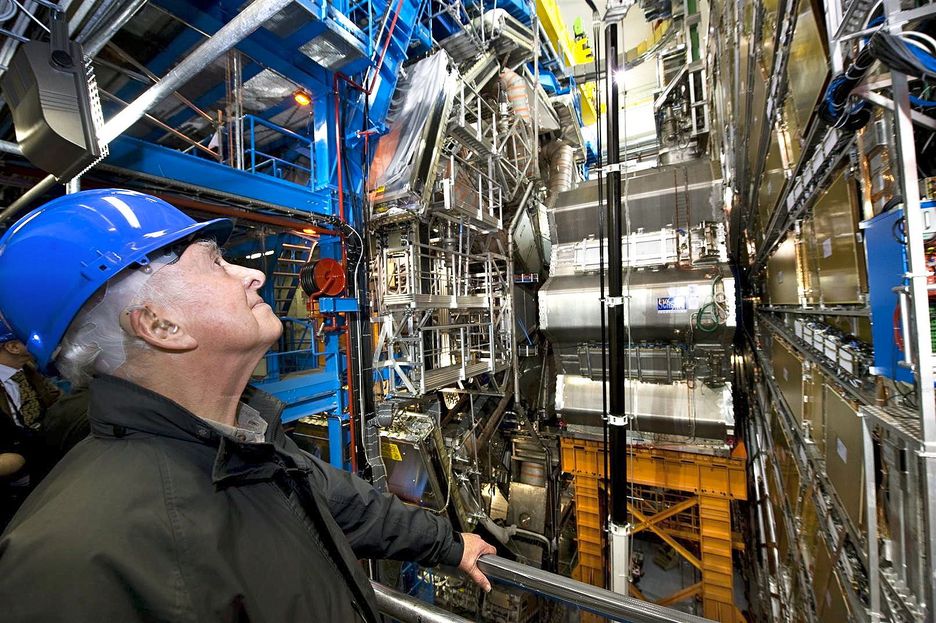
Peter Higgs, discoverer of the boson that bears his name, has shown his disagreement with the name «God particle». Picture taken at CERN's Large Hadron Collider (LHC)
VALENCIA. On the occasion of the Prince of Asturias Award for Technical & Scientific Research granted to Peter Higgs and Françoise Englert for the discovery of the Higgs boson, we review two of issues regarding particle physics that have recently drawn the attention of the media: superluminal neutrinos and the Higgs boson.
If science allows no final statements, that cannot be corroborated and -therefore- refuted (according to Popper), and if we accept that scientific knowledge is «provisional» or knowledge that «has not yet been falsified», experiments that seem to contradict established and accepted statements should not stir up controversy. Stories of theories superseded by other more precise theories appeal to us because they perfectly fit with the idea of science as a discipline continually in progress. This idea helps us keep the faith in unlimited progress and a brighter future. Now, what happens if these «novelties» question the great Einstein? It will at least give rise to much debate. You don't get the chance of bringing mythical figures down every day.
That is what happened on September 23, 2011, when CERN explained that, according to different experiments conducted at the Gran Sasso National Laboratory (Italy), neutrinos might have exceeded the speed of light. Had these results finally proved to be right, they would have questioned Einstein's special theory of relativity. That meant being able to dream about time-travels to the past: too appealing a topic for the media to let it go. So, they did not give it a second thought and spread this controversy while the scientific community embraced the news with a mixture of perplexity and scepticism. CERN called for caution until results were corroborated, but the announcement was too appealing and was therefore hard to stop speculations.
In November 2011, the experiment was conducted again and neutrinos exceeded the speed of light once again. They insisted that new verifications were needed, as indeed new data provided in 2012 showed, which questioned the first results. The mistake pointed to a poor connection of the optical fibre between a GPS reception unit and an input/output card from a computer.
A recent study carried out by Martí Domínguez -Professor of Journalism at the University of Valencia- published in Science Communication analyses this controversy from the point of view of cartoons in different European newspapers. Cartoons are important elements for the analysis of social reality and contribute to the evaluation of how news are received, how society interprets them.
Einstein was wrong
If the scientific discovery had not implied the refutation of Einstein's theories, the issue would not have been so relevant. Einstein has become an icon in the collective imagination. Time magazine named him «person of 20th century» in 1999. That the great scientist might have been wrong was too appealing an idea to give it up and not make the most of it.
There were, therefore, a series of cartoons that exploited this side of Einstein losing against something so intangible as some neutrinos determined to travel faster than light. Despite the caution shown by the scientific community, humourists considered the Einstein vs. neutrinos battle too interesting to let it go. So they decided to depict the scientist sad, wearing donkey ears or sticking out his tongue while CERN scientists stick their tongue out at him.
On the other hand, the possibility of Einstein being wrong was interpreted as putting into question the reliability of science. If Einstein theories proved to be false, what level of reliability was left for science? The process of falsifiability was interpreted more as a weakness than as a guarantee for the progress of knowledge. Instead of seeing it as a triumph of science, the constant revision of its laws was used as evidence of the little importance one should confer to any scientific result. In a cartoon by James Whitworth, a child said to his teacher: «If a neutrino can defy the laws of physics, I can hand over my homework late». After the CERN's refutation, cartoonists were less interested in the news. From the 127 cartoons studied, only 29 of them showed the refutation.
The «god particle»
The Higgs boson is another topic that has recently focused the media attention. On July 4, 2012, CERN claimed to have discovered a particle that, according to corroborations, it was the Higgs boson. Science Magazine proclaimed it the most important scientific discovery of the year. Last March, CERN provided new data that confirmed the hypothesis that it is, indeed, the Higgs boson.
This particle became widely known as The God Particle, thanks to the physicist L. Lederman. The name, suggested by the editor of the book with the aim of making it more appealing for readers, was never accepted by the scientific community, which mistrusted a concept that alluded to a deity. Higgs himself has never liked that term. Despite everything, this name has always had an effect on the media and is normally used still today.
Full text available at Mètode's website.
_________________________________________________________________________
Lucía Sapiña. The Two Cultures Observatory, Mètode, University of Valencia
Noticias relacionadas
 AVISO DE COOKIES: Este sitio web hace uso de cookies con la finalidad de recopilar datos estadísticos anónimos de uso de la web, así como la mejora del funcionamiento y personalización de la experiencia de navegación del usuario. Aceptar
Más información
AVISO DE COOKIES: Este sitio web hace uso de cookies con la finalidad de recopilar datos estadísticos anónimos de uso de la web, así como la mejora del funcionamiento y personalización de la experiencia de navegación del usuario. Aceptar
Más información


 imprimir
imprimir meneame
meneame
 whatsapp
whatsapp
